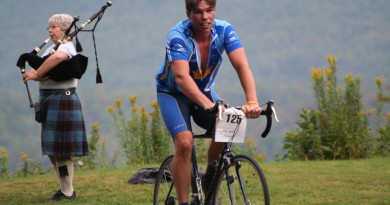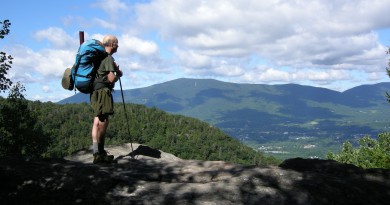Mike Silverman: Dean of the Vermont 50
When Mike Silverman walks into a clothing store, the first thing he does is rub the fabric of a shirt or jacket between his fingers. At the same time, he’s noticing the layout of the sales floor, the colors, the designs, the lighting. The items with price tags are but a small part of the merchandise—in retail, everything that’s on display is for sale, and what the store is selling, above all, is an experience, a feeling. He brings the same ethos to his long-time job as the director of the venerable Vermont 50 running and mountain biking race.
Silverman, 55, is imbued with a retail point-of-view for a good reason: his family owned The Lodge at Harvard Square, a clothing chain that started in Cambridge, MA, and spread out across the eastern seaboard from the late ‘60s to the early ‘90s. After graduating from Clarkson University, he surprised his family by joining the business, starting as a store manager and working his way up to the real estate development duties that accompanied the expansion of the store into Pennsylvania, New Jersey, and
New York.
Following a divorce in 1993, Silverman, a genial guy with the compact build of a gymnast, moved to Hanover, where his parents had retired. He still lives there and works as the manager of Dartmouth College’s cross-country ski center. Hoping to meet people and make some friends, he volunteered with Vermont Adaptive Ski and Sports (VASS), a non-profit organization whose mission is to provide people with disabilities access to recreation. The founder of VASS, Laura Farrell, started the Vermont 100 and the Vermont 50, partially as ways to fundraise for the organization. Silverman participated as a rider in the Vermont 50 for a few years, and then put down his bike and joined the event crew. “I found the enjoyment of being a volunteer just as fulfilling as riding the course,” he says.
The Vermont 50 began in the early ’90s as a running race, mostly over the dirt roads that crisscross West Windsor, Hartland, and South Woodstock. A few years later, looking to increase the number of participants, the race director opened it up to mountain bikers. Slowly, as landowners allowed the race to cross their property, the course shifted from the public roads to old jeep trails, logging roads, and pure singletrack. Simultaneously, the affair became known as a fun, grueling, somewhat epic and competitive mountain bike race.
Silverman became the director in 2000, and since then he’s treated the race, in a way, as his retail shop, making it attractive to a wider variety of people, and always paying attention to the visual details. “What everybody kept seeing was a race,” he says. “I never saw it as a race, I saw it as an event.” If you ask Silverman who won the race each year, he couldn’t tell you, but if you ask if the participants had a good time, he would know the answer.
Most of the time, that answer is yes. Why? First, Silverman and his 250 volunteers have made the race more of a family activity. He added marshmallow roasts and a trail race for kids. He kept the local feel of the occasion, with the home-cooking of Brownsville resident Hilda Yates. And to go with the food, he brought the musical act The Spare Parts (“It’s whomever shows up,” he says). He gives regular course updates to participants via e-mail, so they know what to anticipate. “It all becomes an expectation of hospitality,” he says.
The hard work and welcoming attitude has paid off. In 2008, the online registration for the mountain bike race filled up in a mere 20 minutes. What began as an event with 25 bikers and 100 runners has grown into a weekend party with 1,300 participants. Silverman isn’t sure how much money the race brings to the local business, but he knows that “from Ludlow to White River Junction, we fill most of the hotel rooms,” he says. As for the take-home for VASS, each year the race raises upwards of $30,000, or roughly 10 percent of the organization’s operating budget.
This year, registration for the race opens on May 25th. In all likelihood, the mountain bike portion won’t fill up in 20 minutes—Silverman has bumped the maximum number of riders a little through over-booking, and knows that every year a percentage of registrants don’t show up. But best to sign up early anyway.
For the runners, Silverman is continuing the popular 50 kilometer event and a 50-mile relay race. “I listened to participants,” he says, “and this is what they asked for.”
Last year, the race was a bit of a disappointment, because it rained the entire day. “Cookie dough is how the dirt was described,” Silverman says. Still, for the beginning of the mountain bike race, which descends on a paved road from the base lodge at Mount Ascutney and makes two sharp turns, Silverman jumped in the back of a pick-up truck with a bullhorn to call out the turns to the racers.
“Bad weather or good weather,” he says, “we try to make the participants feel at home.”


